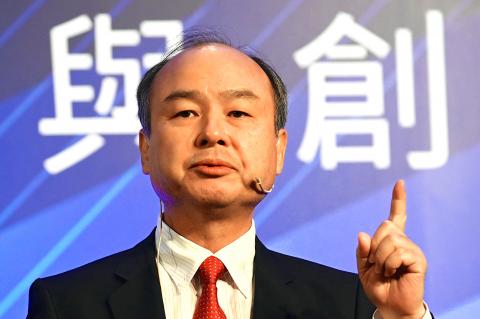Chip designer ARM Holdings PLC, which has close ties to Taiwan Semiconductor Manufacturing Co (TSMC, 台積電), plans to increase its investments in Taiwan, owner Masayoshi Son said on Saturday.
The Japanese billionaire and founder of Softbank Group Corp said that he wants to relist ARM within five years, reintroducing stock markets to the British chipmaker that his company bought for US$32 billion in 2016.
Softbank has not yet decided where the public offering would be held, Son told a technology forum in Taipei.

Photo: Sam Yeh, AFP
In his first public speech in Taiwan, Son said that artificial intelligence (AI) and the information revolution represent the biggest shift in human history, with AI set to dominate technology development trends and improve human lives, rather than take away jobs.
After the forum, which had the theme “Transformation of global technology industries and capital flows,” Son told reporters that ARM would expand its investments in Taiwan in areas such as the Internet of Things and autonomous vehicles, and would hire more engineers, as well as research and development specialists.
The performance of the nation’s semiconductor and technology industries has been outstanding, he said.
Founded in 1990, ARM quietly grew into the UK’s largest listed tech company before Softbank’s takeover. It designs chips that are licensed to the world’s largest technology companies, and, as a result, just about every smartphone, mobile phone and tablet runs on an ARM chip.
On ARM’s relationship with China’s Huawei Technologies Co (華為), which is facing US restrictions, Son said that ARM respects both the US and the firm’s links with China.
The British chipmaker is complying with US restrictions on Huawei and is seeking clarification on them, Son said.
In response to a question by Hon Hai Precision Industry Co (鴻海精密) founder Terry Gou (郭台銘) on maximizing returns on government-run funds, Son said that there are low-risk methods such as system reform, expert recruitment and maintaining a goal of high returns.
Son said that he would be willing to offer his investment experience and ideas to help the government improve the performance of its national pension fund.
Gou is seeking to obtain the Chinese Nationalist Party’s (KMT) nomination to become its presidential candidate in next year’s election.
One of the main planks of Gou’s platform has been restoring benefits to retired military personnel, civil servants and public-school teachers, which were cut last year to help keep the financially strapped pension system afloat.
Additional reporting by Bloomberg

Sweeping policy changes under US Secretary of Health and Human Services Robert F. Kennedy Jr are having a chilling effect on vaccine makers as anti-vaccine rhetoric has turned into concrete changes in inoculation schedules and recommendations, investors and executives said. The administration of US President Donald Trump has in the past year upended vaccine recommendations, with the country last month ending its longstanding guidance that all children receive inoculations against flu, hepatitis A and other diseases. The unprecedented changes have led to diminished vaccine usage, hurt the investment case for some biotechs, and created a drag that would likely dent revenues and

Macronix International Co (旺宏), the world’s biggest NOR flash memory supplier, yesterday said it would spend NT$22 billion (US$699.1 million) on capacity expansion this year to increase its production of mid-to-low-density memory chips as the world’s major memorychip suppliers are phasing out the market. The company said its planned capital expenditures are about 11 times higher than the NT$1.8 billion it spent on new facilities and equipment last year. A majority of this year’s outlay would be allocated to step up capacity of multi-level cell (MLC) NAND flash memory chips, which are used in embedded multimedia cards (eMMC), a managed

CULPRITS: Factors that affected the slip included falling global crude oil prices, wait-and-see consumer attitudes due to US tariffs and a different Lunar New Year holiday schedule Taiwan’s retail sales ended a nine-year growth streak last year, slipping 0.2 percent from a year earlier as uncertainty over US tariff policies affected demand for durable goods, data released on Friday by the Ministry of Economic Affairs showed. Last year’s retail sales totaled NT$4.84 trillion (US$153.27 billion), down about NT$9.5 billion, or 0.2 percent, from 2024. Despite the decline, the figure was still the second-highest annual sales total on record. Ministry statistics department deputy head Chen Yu-fang (陳玉芳) said sales of cars, motorcycles and related products, which accounted for 17.4 percent of total retail rales last year, fell NT$68.1 billion, or

In the wake of strong global demand for AI applications, Taiwan’s export-oriented economy accelerated with the composite index of economic indicators flashing the first “red” light in December for one year, indicating the economy is in booming mode, the National Development Council (NDC) said yesterday. Moreover, the index of leading indicators, which gauges the potential state of the economy over the next six months, also moved higher in December amid growing optimism over the outlook, the NDC said. In December, the index of economic indicators rose one point from a month earlier to 38, at the lower end of the “red” light.